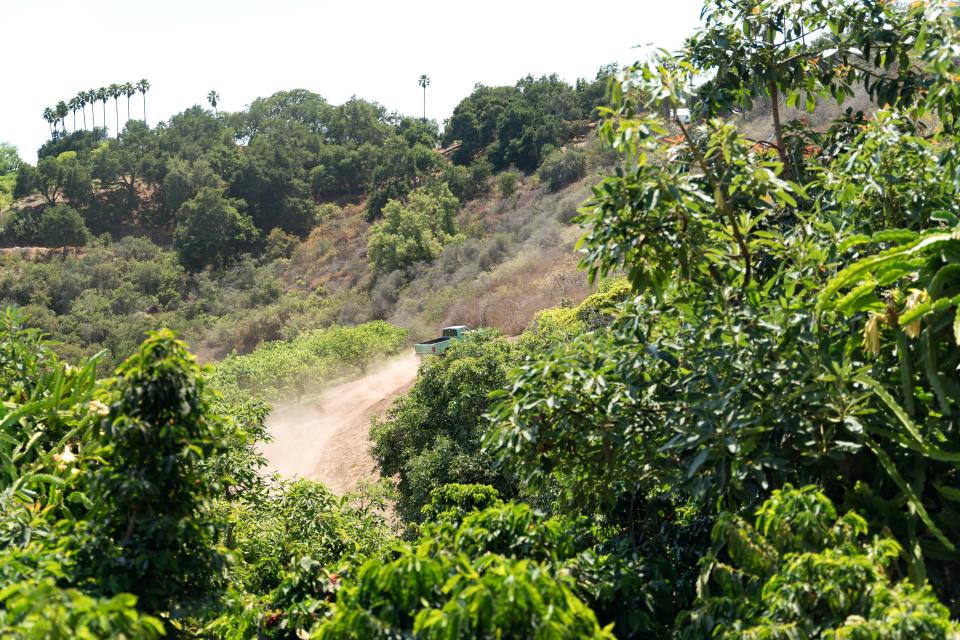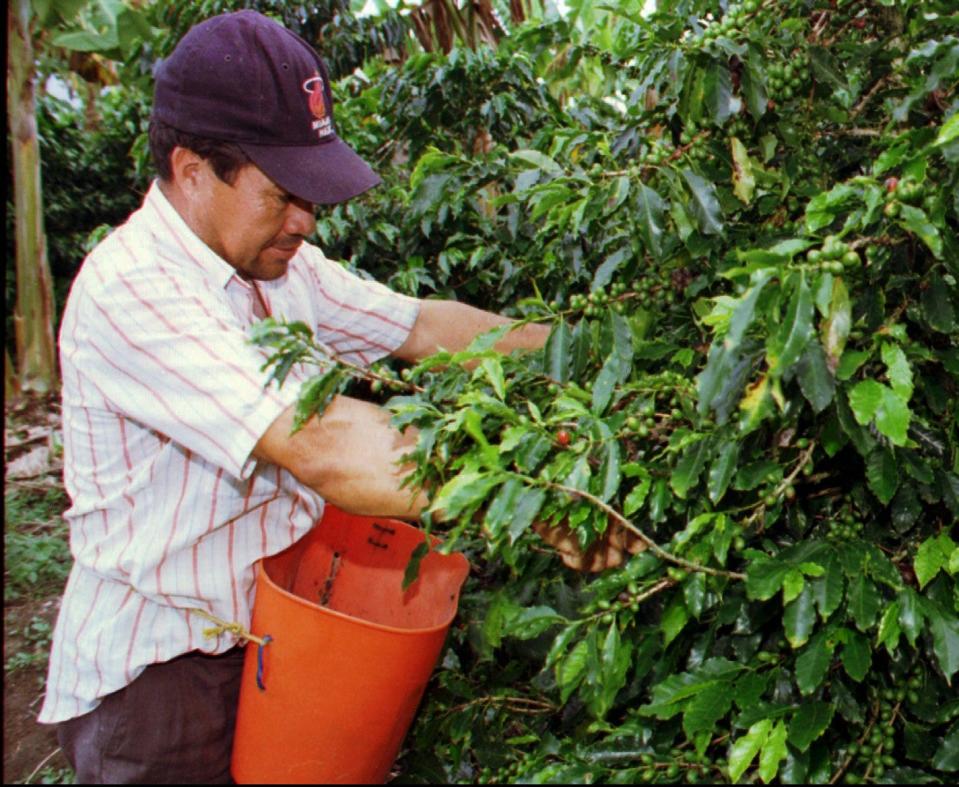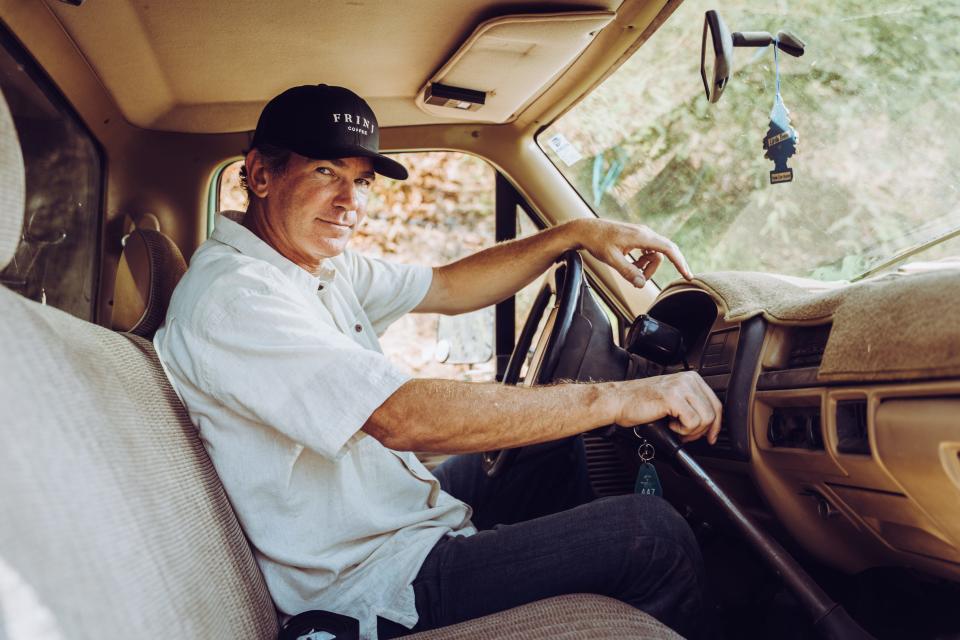Is your coffee made in the US? Not likely, but that could change
The U.S. consumes and imports more coffee than any other country in the world. But could a nation full of coffee drinkers ever grow a significant portion of its own here? Maybe.
In California, there's a domestic coffee farming initiative brewing. More than 70 coffee farms led by Frinj Coffee founder Jay Ruskey are in various states of production. Combined, the farms have surpassed 100,000 coffee trees planted in central and southern California.
"We are using the same resources that we would to grow avocados, but now the farmers gain more, you gain a better cup of coffee and now it doesn’t have to travel thousands of miles to get to you," Ruskey told USA TODAY. "So there are quite a few elements coming together here."
►International Coffee Day: Get a deal at McDonald's, plus free coffee at Casey's, Panera and more
►Coffee makers: These are 2021's best

On the other side of the country, scientists at the University of Florida have been exploring how to grow coffee, too. This fall, researchers have moved some plants outdoors to see how they handle the first frosts of fall and ensuing seasons.
If the plants can flourish, there's a potential for Florida to join the coffee-growing community, too. "We are just at the beginning of this research program," said Chris Wilson, assistant professor of agroecology in the University of Florida agronomy department. "How our results will translate into coffee production in the field … will be a future bridge to cross."
Coffee breakdown: Top producers, consumers
The United States is the world's leading coffee importer, buying the equivalent of 27.7 million bags weighing 60-kilograms (about 132 pounds) between October 2020 and September 2021, according to the International Coffee Organization. (If you add up the countries in the European Union, technically it imports 40.2 million bags.)
Despite the U.S. being the biggest buyer of coffee, Americans are not the biggest coffee drinkers in the world. Americans drank 327.4 cups of coffee, per capita, in 2020, according to research firm Euromonitor. Several countries drank more including Lebanon (1,294.1 cups per capita in 2020), Sweden (1,170.6), Finland (1,065.1), the United Arab Emirates (994.6), and Slovenia (928.7).
Most of the world's coffee is grown in tropical climates, with Brazil producing about 40% of total coffee supplies – the equivalent of 63.4 million bags in the latest season (October 2020-September 2021), according to the International Coffee Organization.
Other leading producers: Vietnam (29 million), Colombia (14.5 million), Indonesia (12 million), Ethiopia (7.4 million), Honduras (6 million), Uganda and India (5.7 million each), and Mexico (4 million).
►Coffee subscriptions: Reviewed.com's best of 2021

The U.S. does have a history of coffee production, primarily in Hawaii, where coffee was first introduced about 200 years ago. In 2020, Hawaii produced 5.12 million pounds of coffee (about 38,000 bags), according to World Coffee Research.
Coffee used from the state's 2020 harvest was valued at about $54.3 million, 8.25% higher than the previous season, according to Hawaii's state agriculture department.
Hawaii was until recently the only state to grow coffee, but the crop has been a part of the history of Puerto Rico, a U.S. territory, for nearly 300 years. However, coffee production in Puerto Rico has declined from $29.3 million in 2012 to $4.8 million in 2018, according to the U.S. Agriculture Department.
Hurricanes including Maria in 2017 ravaged coffee farms in Puerto Rico, wiping out 80% of the trees, according to World Coffee Research. The organization, along with the Hispanic Federation, Nespresso, Starbucks and other groups including the family of "Hamilton" creator Lin-Manuel Miranda, created a five-year initiative to revitalize the island's coffee industry.
►Go ahead, have that third cup of coffee: You just might live longer, new research suggests
Coffee: California dreamin'
Jay Ruskey didn't set out to cultivate a California coffee industry. At Good Land Organics, the farm he began operating in 1992 in Goleta, California near Santa Barbara, he grew avocados and rare fruits.
But in 2000, coffee percolated onto his radar. A friend, Mark Gaskell, an adviser with the University of California Cooperative Extension, was returning from a trip seeing coffee growers in the Kona region of Hawaii. Flying into Santa Barbara, Gaskell told Ruskey that he "looked around the foot hills and said, 'This looked exactly like (the) Kona (region in Hawaii). Maybe we should try coffee.'"

So, Gaskell got some seeds from Panama and Costa Rica and gave them to Ruskey, who planted them in 2002. "I grew them just for fun because there was really no market support" for costly coffee production in California, Ruskey said.
Ruskey grew coffee trees alongside avocado trees, which are taller and can protect the smaller crop. About the time his trees began bearing fruit the demand for fine, high grade specialty coffee began fetching more than $100 a pound at auctions around 2008 and 2009.
Coffee as a crop became a more serious consideration, but Ruskey didn't have all the equipment needed for the labor-intensive process of processing coffee cherries. Coffee is a fruit, which has two beans inside. The beans are fermented, slow-dried and cured, then shucked to remove the green beans, which are finally roasted. "Like brewing beer or making wine, there's this whole art form that I didn't know," Ruskey said.

He acquired the equipment to process coffee and in 2014 his Good Land Organics Caturra received a 91 rating from Coffee Review and was ranked 27th best coffee in the world. Three years later, Ruskey founded Frinj Coffee and now also sells coffee plants to farmers and helps the 70-plus farms currently operating to develop and process their crops.
So far, there are seven farms harvesting coffee, with the number of coffee-producing farms to double next year, Ruskey said. One of the farms, Mraz Family Farms in Oceanside, California, was founded six years ago by musician Jason Mraz, who began growing coffee along with avocados and passion fruit.

Mraz has sold all the coffee he has brought to market since 2019. The latest Geisha Coffee, named after a bean usually grown in Panama, Ethiopia or Colombia, has sold out, priced at $80 per 5-ounce bag. The Frinj Coffee system "is unique for the global coffee industry," Mraz said in a press release. "By considering this extremely rare pour, the coffee connoisseur enjoys an unparalleled complex cup of coffee and does their part to promote local, regenerative agriculture and a fair trade."
The coffees available on FrinjCoffee.com cost $50 or $80 for a 5-ounce bag, which will make about 10 to 12 cups of coffee, depending on the strength (that's about $4-$8 per cup). The Good Land Organics Canturra ($50), which earned Ruskey those initial accolades, is described as having notes of "candied lemon, bright grapefruit acidity, and a sweet touch of pomegranate."
The price is right, Ruskey said, because the only way California coffee can compete is on quality, delivering unique specialty coffees.
"We're trying to make it so our producers make some of the finest tasting coffees in the world, like the wine industry," he said. "We can’t play in the commodity market, we have to be the best in the world."
Even as production increases, "we are still just a drop in the bucket of the total coffee production in the world," Ruskey said. But the additional crop helps local farmers, especially if consumers gain a greater appreciation for coffee's part of their day and "how hard it is for the farmer to produce this crop," he said.
The sunshine state of coffee
In Florida, the coffee experiment is just underway. The University of Florida researchers have been experimenting with arabica coffee trees, grown interspersed with citrus trees, which can shade and protect the smaller coffee trees. Most of the experiments have been done within greenhouses.
Miniature cameras in plastic tubes planted along with some of the –coffee plants will also watch and record the roots' development. The school's College of Engineering will use artificial intelligence and machine learning to monitor that data and better understand the plants' development.
Coffee can be grown in Florida, but what needs to be studied is whether the climate will allow it to grow in a manner to achieve a tasty result. "It’s can you grow any you would ever want to drink?" said Luke Flory, a University of Florida professor in the agronomy department. "That is really the question right now."
Follow Mike Snider on Twitter: @MikeSnider.
This article originally appeared on USA TODAY: Is coffee made in the US? Something is brewing in California, Florida

